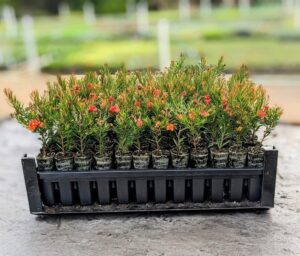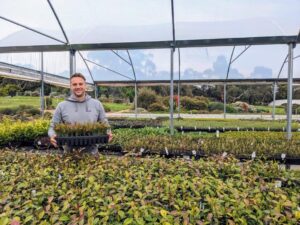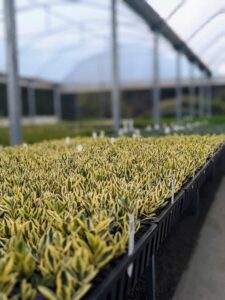
Less plastic, more fantastic
By Lisa Wightwick
Over the past few years, the term ‘sustainability’ has been increasingly utilised in the world’s collective vocabulary. This greater awareness of anthropogenic environmental impact has necessitated products and practices that either minimise or negate them. Ironically, the horticulture industry, particularly the production sector, isn’t actually as ‘green’ as it might seem.
Consumption of water, land and power, use of fertilisers and pesticides, production of carbon emissions and general waste – predominantly plastic, are among many factors that can harm the environment. There is already a movement underway by the industry to minimise its effects on the environment, and new initiatives are constantly being established.
The wholesale production nursery where I work in Victoria has recently innovated a new product as an alternative to single-use plastic cell trays. The new EnviroGrow96 sustainable cell tray was designed to combat plastic waste generated by single-use cell trays used extensively in production nurseries.
Currently, single-use polystyrene (PS6) plastic trays are manufactured overseas and shipped to Australia, and after one use, sometimes recycled, or disposed of in landfill. Some of these trays can never even be used once as they are brittle and prone to breakage, so occasionally, PS6 trays are thrown away before they can be used, or are discarded halfway through their use due to breakage, which unnecessarily increases consumption.

In November of 2022, second-generation nursery manager Liam Barfoot first proposed the concept of a long-life, locally manufactured injection mould tray created with predominantly recycled polypropylene (PP5) plastic. The new tray would have an estimated life span of 10+ years, compared to the current single-use product, which usually lasts up to a month. The EnviroGrow96 trays could be put through an industrial washer, which uses recycled water and is reused indefinitely due to their durable construction. The utilisation of this new tray type would eliminate international freighting of PS6 trays, support local manufacturing, and minimise the need for energy-consuming recycling, drastically reducing businesses’ carbon footprint.

Once the EnviroGrow96 trays reach the end of their lifespan, they could be collected and recycled through the PP5 initiative – a closed-loop recycling system in which PP5 plastic products are taken directly to a processing plant where they are broken down into raw material that is used to manufacture more trays. Many trays are saved from entering waste streams that end up in landfills.
Liam worked extensively with designers, engineers, local plastic injection moulding companies and steel fabricators to create a tray prototype incorporating features to augment strength and durability, in addition to practical features to assist in general handling and even plant growth. After successful prototype testing, mass production of the EnviroGrow96 commenced in March of 2023, and trays were manufactured to replace all existing trays in the nursery. The tray was fully implemented in the nursery, and there were very few teething issues.
Previously, the nursery consumed an estimated 15,000 PS6 trays per year. The same 15,000 EnviroGrow96 trays can be used repeatedly for the next ten years (or possibly longer). In those 10-plus years, at least 150,000 single-use PS6 trays would have been consumed. The nursery can now focus on creating plants without the plastic waste to match.
Significant improvements to production efficiency were noted shortly after the full-scale implementation of the EnviroGrow96 trays. Manual handling is now easier for workers as they no longer have to contend with fragile, unstable trays. Gone are the days of double-handling stock when replacing broken trays, as the EnviroGrow96 tray can withstand heavy force without breaking and is much less susceptible to weakening by UV and heat than its predecessor, thanks to the addition of UV stabilisers.
Thoughtfully designed add-ons to the tray have sped up and improved processes such as dibbling of holes in the mix. The trays’ compatibility with automated nursery equipment has also contributed to the large increase in production efficiency. Customers can also streamline their efficiencies with the EnviroGrow96 tray; potting stock is easier, and they have the option to use robotic planters that are compatible with the tray. There have even been improvements in root growth of the stock, as ‘trainers’ were included in the design to encourage roots to grow straight down instead of around in tangles. The trays are returned to the nursery upon the next delivery or collection of stock by a customer, washed and re-used, continuing the sustainable cycle.
This project has been a great success and will hopefully be a big step in the right direction towards a sustainable future for the production nursery industry. Peninsula Growers would like to thank the Victorian State Government for supporting the EnviroGrow96 reusable tray project through the Low Carbon Manufacturing Grant Program – Business Growth Stream. Incentives like this make it possible to bring these types of ideas and innovations to life, driving the industry forward.
The EnviroGrow96 tray will be viewable in action at the regional IPPS meeting in December hosted by Peninsula Growers!
All images by Lisa Wightwick
Lisa Wightwick
International Plant Propagators Society
Peninsula Growers
